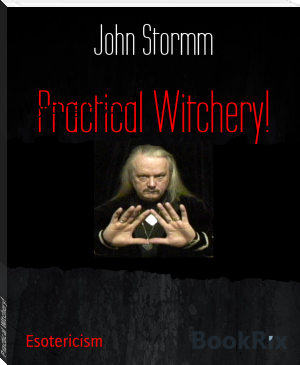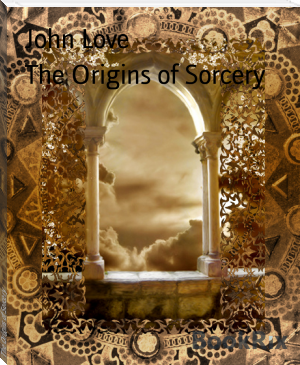Esoteric Christianity, or The Lesser Mysteries by Annie Besant (books like harry potter .txt) 📕

Read free book «Esoteric Christianity, or The Lesser Mysteries by Annie Besant (books like harry potter .txt) 📕» - read online or download for free at americanlibrarybooks.com
- Author: Annie Besant
Read book online «Esoteric Christianity, or The Lesser Mysteries by Annie Besant (books like harry potter .txt) 📕». Author - Annie Besant
CHAPTER VI.
THE MYSTIC CHRIST.
We now approach that deeper side of the Christ story that gives it its real hold upon the hearts of men. We approach that perennial life which bubbles up from an unseen source, and so baptises its representative with its lucent flood that human hearts cling round the Christ, and feel that they could almost more readily reject the apparent facts of history than deny that which they intuitively feel to be a vital, an essential truth of the higher life. We draw near the sacred portal of the Mysteries, and lift a corner of the veil that hides the sanctuary.
We have seen that, go back as far as we may into antiquity, we find everywhere recognised the existence of a hidden teaching, a secret doctrine, given under strict and exacting conditions to approved candidates by the Masters of Wisdom. Such candidates were initiated into "The Mysteries"--a name that covers in antiquity, as we have seen, all that was most spiritual in religion, all that was most profound in philosophy, all that was most valuable in science. Every great Teacher of antiquity passed through the Mysteries and the greatest were the Hierophants of the Mysteries; each who came forth into the world to speak of the invisible worlds had passed through the portal of Initiation and had learned the secret of the Holy Ones from Their own lips: each who came forth came forth with the same story, and the solar myths are all versions of this story, identical in their essential features, varying only in their local colour.
This story is primarily that of the descent of the Logos into matter, and the Sun-God is aptly His symbol, since the Sun is His body, and He is often described as "He that dwelleth in the Sun." In one aspect, the Christ of the Mysteries is the Logos descending into matter, and the great Sun-Myth is the popular teaching of this sublime truth. As in previous cases, the Divine Teacher, who brought the Ancient Wisdom and republished it in the world, was regarded as a special manifestation of the Logos, and the Jesus of the Churches was gradually draped with the stories which belonged to this great One; thus He became identified, in Christian nomenclature, with the Second Person in the Trinity, the Logos, or Word of God,[188] and the salient events recounted in the myth of the Sun-God became the salient events of the story of Jesus, regarded as the incarnate Deity, the "mythic Christ." As in the macrocosm, the kosmos, the Christ of the Mysteries represents the Logos, the Second Person in the Trinity, so in the microcosm, man, does He represent the second aspect of the Divine Spirit in man--hence called in man "the Christ."[189] The second aspect of the Christ of the Mysteries is then the life of the Initiate, the life which is entered on at the first great Initiation, at which the Christ is born in man, and after which He develops in man. To make this quite intelligible, we must consider the conditions imposed on the candidate for Initiation, and the nature of the Spirit in man.
Only those could be recognised as candidates for Initiation who were already good as men count goodness, according to the strict measure of the law. Pure, holy, without defilement, clean from sin, living without transgression--such were some of the descriptive phrases used of them.[190] Intelligent also must they be, of well-developed and well-trained minds.[191] The evolution carried on in the world life after life, developing and mastering the powers of the mind, the emotions, and the moral sense, learning through exoteric religions, practising the discharge of duties, seeking to help and lift others--all this belongs to the ordinary life of an evolving man. When all this is done, the man has become "a good man," the Chrêstos of the Greeks, and this he must be ere he can become the Christos, the Anointed. Having accomplished the exoteric good life, he becomes a candidate for the esoteric life, and enters on the preparation for Initiation, which consists in the fulfilment of certain conditions.
These conditions mark out the attributes he is to acquire, and while he is labouring to create these, he is sometimes said to be treading the Probationary Path, the Path which leads up to the "Strait Gate," beyond which is the "Narrow Way," or the "Path of Holiness," the "Way of the Cross." He is not expected to develop these attributes perfectly, but he must have made some progress in all of them, ere the Christ can be born in him. He must prepare a pure home for that Divine Child who is to develop within him.
The first of these attributes--they are all mental and moral--is _Discrimination_; this means that the aspirant must begin to separate in his mind the Eternal from the Temporary, the Real from the Unreal, the True from the False, the Heavenly from the Earthly. "The things which are seen are temporal," says the Apostle; "but the things which are not seen are eternal."[192] Men are constantly living under the glamour of the seen, and are blinded by it to the unseen. The aspirant must learn to discriminate between them, so that what is unreal to the world may become real to him, and that which is real to the world may to him become unreal, for thus only is it possible to "walk by faith, not by sight."[193] And thus also must a man become one of those of whom the Apostle says that they "are of full age, even those who by reason of use have their senses exercised to discern both good and evil."[194] Next, this sense of unreality must breed in him _Disgust_ with the unreal and the fleeting, the mere husks of life, unfit to satisfy hunger, save the hunger of swine.[195] This stage is described in the emphatic language of Jesus: "If any man come to me, and hate not his father, and mother, and wife, and children, and brethren, and sisters, yea, and his own life also, he cannot be my disciple."[196] Truly a "hard saying," and yet out of this hatred will spring a deeper, truer, love, and the stage may not be escaped on the way to the Strait Gate. Then the aspirant must learn _Control of thoughts_, and this will lead to _Control of actions_, the thought being, to the inner eye, the same as the action: "Whosoever looketh on a woman to lust after her, _hath committed adultery_ with her already in his heart."[197] He must acquire _Endurance_, for they who aspire to tread "the Way of the Cross" will have to brave long and bitter sufferings, and they must be able to endure, "as seeing Him who is invisible."[198] He must add to these _Tolerance_, if he would be the child of Him who "maketh His sun to rise on the evil, and on the good, and sendeth rain on the just and on the unjust,"[199] the disciple of Him who bade His apostles not to forbid a man to use His name because he did not follow with them.[200] Further, he must acquire the _Faith_ to which nothing is impossible,[201] and the _Balance_ which is described by the Apostle.[202] Lastly, he must seek only "those things which are above,"[203] and long to reach the beatitude of the vision of and union with God.[204] When a man has wrought these qualities into his character he is regarded as fit for Initiation, and the Guardians of the Mysteries will open for him the Strait Gate. Thus, but thus only, he becomes the prepared candidate.
Now, the Spirit in man is the gift of the Supreme God, and contains within itself the three aspects of the Divine Life--Intelligence, Love, Will--being the Image of God. As it evolves, it first develops the aspect of Intelligence, develops the intellect, and this evolution is effected in the ordinary life in the world. To have done this to a high point, accompanying it with moral development, brings the evolving man to the condition of the candidate. The second aspect of the Spirit is that of Love, and the evolution of that is the evolution of the Christ. In the true Mysteries this evolution is undergone--the disciple's life is the Mystery Drama, and the Great Initiations mark its stages. In the Mysteries performed on the physical plane these used to be dramatically represented, and the ceremonies followed in many respects "the pattern" ever shown forth "on the Mount," for they were the shadows in a deteriorating age of the mighty Realities in the spiritual world.
The Mystic Christ, then, is twofold--the Logos, the Second Person of the Trinity, descending into matter, and the Love, or second, aspect of the unfolding Divine Spirit in man. The one represents kosmic processes carried on in the past and is the root of the Solar Myth; the other represents a process carried on in the individual, the concluding stage of his human evolution, and added many details in the Myth. Both of these have contributed to the Gospel story, and together form the Image of the "Mystic Christ."
Let us consider first the kosmic Christ, Deity becoming enveloped in matter, the becoming incarnate of the Logos, the clothing of God in "flesh."
When the matter which is to form our solar system is separated off from the infinite ocean of matter which fills space, the Third Person of the Trinity--the Holy Spirit--pours His Life into this matter to vivify it, that it may presently take form. It is then drawn together, and form is given to it by the life of the Logos, the Second Person of the Trinity, who sacrifices Himself by putting on the limitations of matter, becoming the "Heavenly Man," in whose Body all forms exist, of whose Body all forms are part. This was the kosmic story, dramatically shown in the Mysteries--in the true Mysteries seen as it occurred in space, in the physical plane Mysteries represented by magical or other means, and in some parts by actors.
These processes are very distinctly stated in the _Bible_; when the "Spirit of God moved upon the face of the waters" in the darkness that was "upon the face of the deep,"[205] the great deep of matter showed no forms, it was void, inchoate. Form was given by the Logos, the Word, of whom it is written that "all things were made by Him; and without Him was not anything made that was made."[206] C. W. Leadbeater has well put it: "The result of this first great outpouring [the 'moving' of the Spirit] is the quickening of that wonderful and glorious vitality which pervades all matter (inert though it may seem to our dim physical eyes), so that the atoms of the various planes develop, when electrified by it, all sorts of previously latent attractions and repulsions, and enter into combinations of all kinds."[207]
Only when this work of the Spirit has been done can the Logos, the kosmic Mystic Christ, take on Himself the clothing of matter, entering in very truth the Virgin's womb, the womb of Matter as yet virgin, unproductive. This matter had been vivified by the Holy Spirit, who, overshadowing the Virgin, poured into it His life, thus preparing it to receive the life of the Second Logos, who





Comments (0)